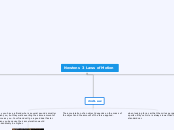Newtons 3 Laws of Motion
1st Law
If a fire truck hits another car the ladder on top of the fire truck will keep going.because what is in motion stays in motion.
An object at rest remain at rest, and an object in motion remains in motion at constant speed and in a straight line unless acted upon by an unbalanced force.
Subtopic
So if your riding a skate board and fly off the skate board would keep going.
2nd Law
Say you have a friend who is several pounds smaller than you, but they walk exerting the same amount of force as you. Your friend will go a good deal faster than you because their acceleration would undoubtedly be higher.
The acceleration of an object depends on the mass of the object and the amount of the force applied.
when looking for a car that the miles per gallon of a sports utility vehicle is always lower than that of a standard car.
3rd Law
A bird flies by use of its wings. The wings of a bird push air downwards. Since forces result from mutual interactions, the air must also be pushing the bird upwards. The size of the force on the air equals the size of the force on the bird; the direction of the force on the air (downwards) is opposite the direction of the force on the bird (upwards). For every action, there is an equal (in size) and opposite (in direction) reaction. Action-reaction force pairs make it possible for birds to fly.
Subtopic
Whenever one object exerts a force on a second object, the second objects exerts an equal and opposite force on the first.
Consider the motion of a car on the way to school. A car is equipped with wheels that spin. As the wheels spin, they grip the road and push the road backwards. Since forces result from mutual interactions, the road must also be pushing the wheels forward. The size of the force on the road equals the size of the force on the wheels (or car); the direction of the force on the road (backwards) is opposite the direction of the force on the wheels (forwards). For every action, there is an equal (in size) and opposite (in direction) reaction. Action-reaction force pairs make it possible for cars to move along a roadway surface.
